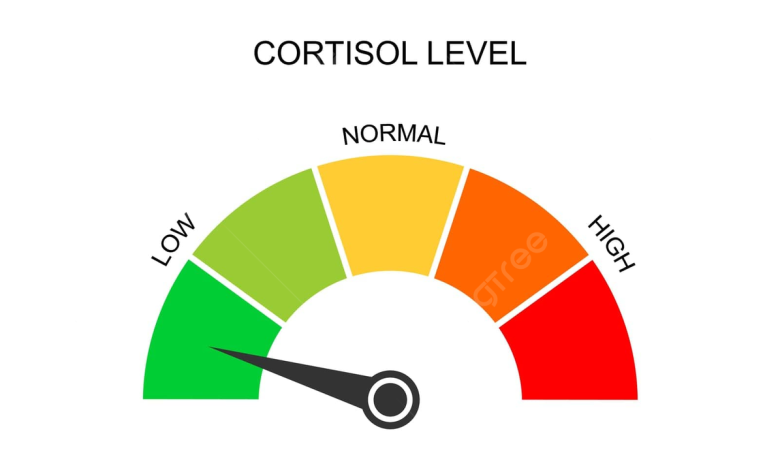10 Strategies for Effectively Reducing Cortisol Levels: A Comprehensive Guide

Cortisol, often referred to as the “stress hormone,” is a crucial component of the endocrine system and plays a pivotal role in the body’s response to stress. Produced by the adrenal glands, cortisol influences various physiological functions, including metabolism, immune response, and the sleep-wake cycle.
While cortisol is essential for the body’s adaptation to stressors, chronic elevation of cortisol levels can have significant implications for health. In this comprehensive exploration, we will delve into the intricacies of cortisol, examining its functions, regulation, daily fluctuations, the potential consequences of prolonged imbalances, and strategies to effectively help reduce cortisol levels.
The Role of Cortisol
Cortisol is a steroid hormone that belongs to the glucocorticoid class. It is produced in the adrenal cortex, the outer part of the adrenal glands located on top of each kidney. The primary function of cortisol is to mobilize the body’s resources in response to stress. This stress response is often referred to as the “fight-or-flight” response, where the body prepares to confront a threat or flee from it.
Key roles of cortisol include:
• Glucose Regulation: Cortisol stimulates the liver to convert stored glycogen into glucose, providing a quick energy source for the body during times of stress.
• Immune System Modulation: Cortisol has anti-inflammatory properties and plays a role in regulating the immune response. It helps control excessive inflammation that may occur in response to stressors.
• Metabolism: Cortisol influences metabolism by regulating the breakdown of fats and proteins, ensuring a steady supply of energy during stress.
• Blood Pressure Regulation: Cortisol works in conjunction with other hormones to regulate blood pressure, helping to maintain cardiovascular homeostasis during stress.
Daily Cortisol Fluctuations
Cortisol levels in the body follow a circadian rhythm, meaning they vary throughout the day in a predictable pattern. The highest levels are typically observed in the early morning, shortly after waking, to provide the necessary energy for the day. As the day progresses, cortisol levels gradually decline, reaching their lowest point in the evening and early night. This diurnal rhythm is essential for maintaining a healthy sleep-wake cycle and overall well-being.
Disruptions to this natural rhythm, such as irregular sleep patterns or night-shift work, can lead to dysregulation of cortisol levels and potential health consequences. Chronic disruptions may contribute to conditions like insomnia, fatigue, and an increased risk of certain health issues.
Stress and Cortisol Elevation
The release of cortisol is a central component of the body’s response to stress. When an individual encounters a stressor, whether physical or psychological, the hypothalamus, a region of the brain, signals the pituitary gland to release adrenocorticotropic hormone (ACTH). ACTH, in turn, stimulates the adrenal glands to produce and release cortisol into the bloodstream.
While acute stress and the resulting cortisol release are adaptive responses designed to help the body cope with immediate challenges, chronic stress can lead to persistent elevation of cortisol levels. Prolonged exposure to elevated cortisol, often associated with chronic stressors like work-related pressures, relationship difficulties, or financial concerns, can contribute to a range of health issues.
Implications of Chronic Cortisol Elevation
Persistent elevation of cortisol levels can have wide-ranging effects on the body, impacting physical and mental health. Some of the potential consequences include:
• Impaired Immune Function: While cortisol has anti-inflammatory properties, chronic elevation can suppress the immune system, making the body more susceptible to infections and illnesses.
• Metabolic Changes: Prolonged cortisol elevation may contribute to metabolic disturbances, including insulin resistance and increased fat deposition, particularly in the abdominal area.
• Cardiovascular Effects: Elevated cortisol levels have been linked to increased blood pressure and a higher risk of cardiovascular diseases.
• Cognitive Impairments: Chronic stress and cortisol dysregulation may adversely affect cognitive function, leading to issues such as impaired memory and concentration.
• Mood Disorders: Cortisol imbalances have been associated with mood disorders, including anxiety and depression. The intricate interplay between cortisol and neurotransmitters in the brain contributes to emotional well-being.
Strategies to Effectively Help Reduce Cortisol Levels
Fortunately, there are several lifestyle and wellness strategies that can effectively help reduce cortisol levels. In this article, we will explore these strategies, providing practical tips for individuals seeking to manage and lower their cortisol levels naturally.
1. Regular Exercise: Engaging in regular physical activity is a powerful way to reduce cortisol levels. Exercise not only helps to dissipate the physical tension associated with stress but also triggers the release of endorphins, the body’s natural mood enhancers. Aim for a mix of aerobic exercises, strength training, and activities like yoga, which has been shown to have stress-reducing benefits.
2. Balanced Nutrition: Adopting a well-balanced diet is crucial for cortisol regulation. Ensure that your meals include a mix of complex carbohydrates, lean proteins, and healthy fats. Avoid excessive caffeine and sugar intake, as these can contribute to cortisol spikes. Incorporate foods rich in omega-3 fatty acids, such as fatty fish, flaxseeds, and walnuts, as they have anti-inflammatory properties.
3. Adequate Sleep: Quality sleep is essential for cortisol regulation. Establish a consistent sleep routine, aiming for 7-9 hours of uninterrupted sleep per night. Create a conducive sleep environment by keeping the room dark, quiet, and cool. Limit exposure to electronic devices before bedtime, as the blue light emitted can interfere with the production of sleep-inducing hormones.
4. Stress Management Techniques: Practicing stress management techniques can significantly impact cortisol levels. Consider incorporating mindfulness meditation, deep breathing exercises, or progressive muscle relaxation into your daily routine. These techniques help activate the body’s relaxation response, mitigating the effects of chronic stress.
5. Social Connections: Building and maintaining strong social connections can positively influence cortisol levels. Engage in activities with friends and loved ones, fostering a support system. Social interactions trigger the release of oxytocin, a hormone that counteracts the effects of cortisol and promotes feelings of well-being.
6. Limiting Stimulant Intake: Minimize the consumption of stimulants like caffeine and nicotine, especially during stressful periods. While these substances can provide temporary energy boosts, they can also contribute to cortisol elevation. Consider replacing caffeinated beverages with herbal teas or decaffeinated options.
7. Time Management and Prioritization: Efficient time management and prioritization can help reduce the overwhelming feelings that contribute to elevated cortisol levels. Break tasks into manageable steps, set realistic goals, and delegate when possible. This approach can foster a sense of control and accomplishment, positively impacting stress levels.
8. Spending Time in Nature: Spending time in nature has been linked to reduced cortisol levels and improved overall well-being. Whether it’s a walk in the park, a hike in the mountains, or simply enjoying a green space, connecting with nature provides a respite from the demands of daily life and promotes relaxation.
9. Hydration: Staying adequately hydrated is crucial for overall health and can also impact cortisol levels. Dehydration can lead to increased cortisol production as the body perceives dehydration as a stressor. Aim to drink sufficient water throughout the day to support optimal hydration.
10. Mindful Eating: Practicing mindful eating involves paying attention to the sensory aspects of eating and being present in the moment. Avoid rushing through meals, and savor each bite. This approach not only promotes healthy digestion but also signals to the body that it is nourished, helping to regulate cortisol levels.
Conclusion
Effectively managing cortisol levels is essential for maintaining overall health and well-being. By incorporating these lifestyle strategies into your daily routine, you can create a comprehensive approach to reduce chronic stress and promote hormonal balance. It’s important to note that individual responses may vary, and consulting with healthcare professionals or stress management experts can provide personalized guidance based on your specific needs and circumstances. Embracing a holistic approach to stress reduction can lead to long-term benefits for both physical and mental health.





